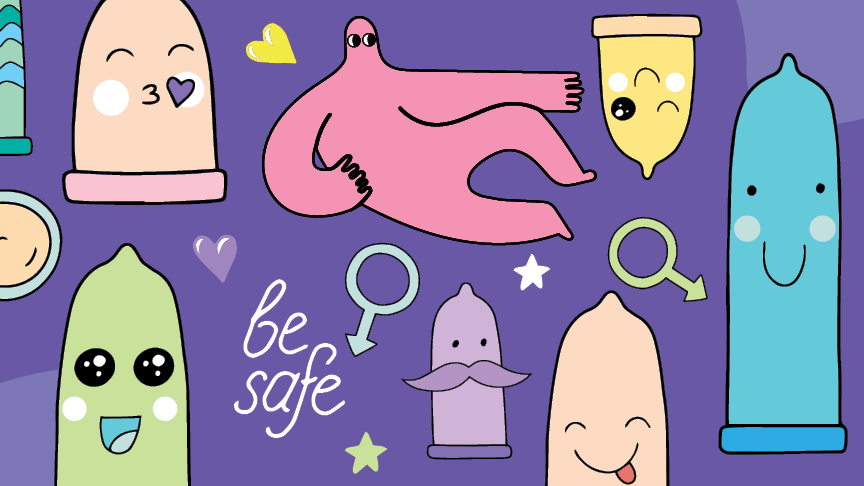
This feature provides information to help you and your partner have a healthy sexual relationship. It provides information about how to be safe and respectful, who to turn to if you have more questions, and how to start having conversations with your partner about sex.
First things first – what to consider before you have sex
There are some things to consider before you start having sex – whether it’s for the first time, or with a new partner.
- Is this something your partner wants to do? Consent is important.
- When was your last sexual health check-up?
- What sort of contraception should you use?
- Where can you go for more information?
There are a number of places you can go for more information. The best place to start is with your doctor. You can also visit Kobi Place at Baillie Henderson Hospital, True Relationships or our Mobile Women’s Health Nurses.
Staff at Kobi Place can help with:
- Sexual health check-ups
- Information about STIs (sexually transmitted infections) and how to avoid them
- Free condoms!
Once you’re informed, now’s the time to talk with your partner.
Conversation starters and consent
How do you start to talk to your partner about having sex? Before having sex, it’s a good idea to have an open and honest conversation with your partner. This conversation may not feel very romantic, but even if it feels awkward, but having a conversation before can help to make sure everyone is on the same page. Here are a few conversation prompts:
- “How would you feel if I kissed you?”
- “Do you want to have sex right now?”
- “Does this feel good?”
- “Can I touch you here?”
- “Are you comfortable?”
It’s important that both you and your partner agree to have sex (with an enthusiastic YES!).
Consent is everything!
Consent is the most important thing for both of you, so what does that look like?
Consent is the ‘yes’ you give when you have the freedom to say ‘no!’. It is:
- Freely given without pressure.
- Specific – for example, you can yes to one act (kissing) and no to another act (oral sex).
- Ongoing – it is ok to change your mind at any time or stage.
- Informed – there is no deceiving or lying. You can’t say you’ll use a condom, and then not. That isn’t full consent.
- Enthusiastic – it’s about wanting to do something, not feeling like you have to do it.
For more information about consent, visit The most important rule of sex: consent | Queensland Health
What contraception should we use?
Condoms are designed to lessen the risk of getting an STI or an unplanned pregnancy. It’s always a good idea to talk to your health professional to discuss the right contraception for you. Condoms are a good start. Using them with a water-based lubricant (not Vaseline!) help stop them from breaking.
There are different flavours, colours, sizes – it’s about finding what works for you and your partner. It’s important to store condoms in a cool, dry place – and not in your wallet or purse! They can get damaged or break down. You can buy them at most shops, chemists, or petrol stations and Kobi Place has free condoms available.
When was your last sexual health check-up?
A sexual health check-up can test if you have any STIs before starting a new relationship. The check-up is done by a nurse who will chat to you and make sure they do the right tests for you.
Just remember, if you test negative to all STI’s, this doesn’t mean you shouldn’t use protection!
How do I know if I have an STI?
Well, you might not know. That’s why it’s important to have a sexual health check-up before starting a new relationship.
Some STI’s don’t have symptoms and can only be found through tests.
STI’s are very common and are usually easy to treat. But without treatment, they can lead to some serious health conditions.
How do I avoid an STI?
Using a condom with water-based lubricant will greatly reduce the risk of more STI’s like chlamydia, gonorrhoea, syphilis and HIV.
What to do if things don’t go to plan
There’s no easy way to say this, but sex can be messy. And sometimes things don’t go to plan. The condom might break or slip off or spill. And if that happens, there’s the risk of pregnancy and/or STI’s.
But don’t worry, there’s always things that can be done.
Emergency contraception (formally known as the ‘morning after pill’) can be used to prevent pregnancy if the condom breaks or you forget to use one. It’s best to take it 24 hours after sex, but it can still be taken up to five days after sex. Visit a chemist, doctor, Kobi Place or True Relationships for emergency contraception.
If you have had unprotected sex, give Kobi Place a call to check when you should come in for a sexual health check-up.
Where to go for help or more information:
- Kobi Place (Baillie Henderson Hospital). All services are free. Ring ahead to book. Phone: 07 4616 6446
- True Relationships and reproductive health or phone: 07 4632 8166
- 1800 RESPECT (1800 737 732)
- Kids Helpline (1800 55 1800)
- Your school-based youth health nurse
- Your GP (doctor)
- Our Mobile Women’s Health Nurses
- A parent or other adult you trust.